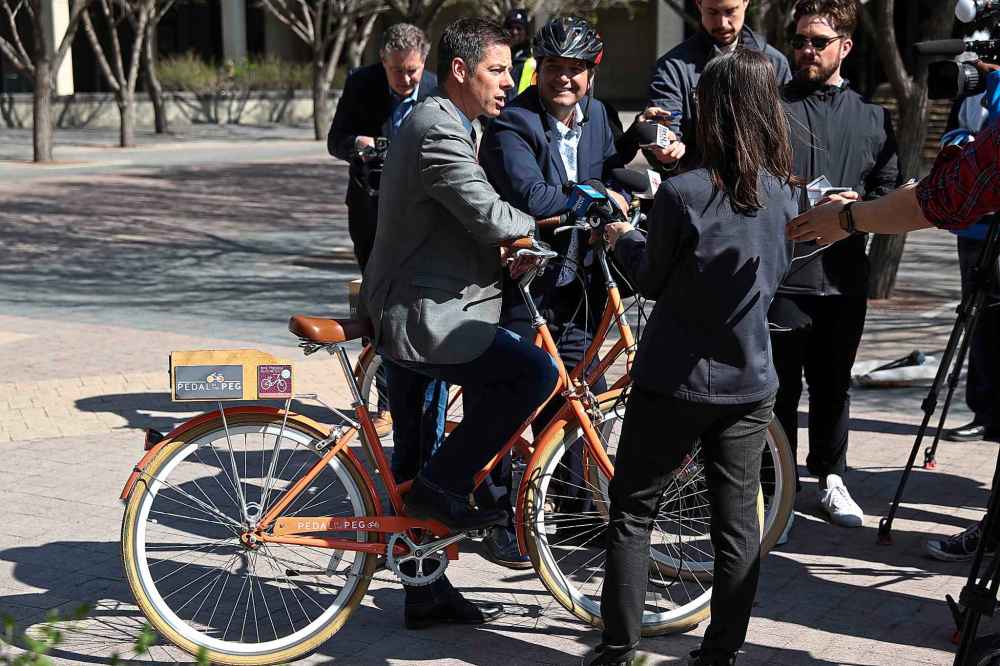City bike-share program starts small, aims to expand Pedal in the Peg offers 22 cycles at five locations
Read this article for free:
or
Already have an account? Log in here »
To continue reading, please subscribe:
Monthly Digital Subscription
$0 for the first 4 weeks*
- Enjoy unlimited reading on winnipegfreepress.com
- Read the E-Edition, our digital replica newspaper
- Access News Break, our award-winning app
- Play interactive puzzles
*No charge for 4 weeks then price increases to the regular rate of $19.00 plus GST every four weeks. Offer available to new and qualified returning subscribers only. Cancel any time.
Monthly Digital Subscription
$4.75/week*
- Enjoy unlimited reading on winnipegfreepress.com
- Read the E-Edition, our digital replica newspaper
- Access News Break, our award-winning app
- Play interactive puzzles
*Billed as $19 plus GST every four weeks. Cancel any time.
To continue reading, please subscribe:
Add Free Press access to your Brandon Sun subscription for only an additional
$1 for the first 4 weeks*
*Your next subscription payment will increase by $1.00 and you will be charged $16.99 plus GST for four weeks. After four weeks, your payment will increase to $23.99 plus GST every four weeks.
Read unlimited articles for free today:
or
Already have an account? Log in here »
Hey there, time traveller!
This article was published 16/05/2018 (2768 days ago), so information in it may no longer be current.
The training wheels have come off bike sharing in Winnipeg.
Downtown Winnipeg BIZ, with funding from the City of Winnipeg, officially launched the city’s first bike-sharing program Wednesday morning.
Called Pedal in the Peg, the program – which is targeting both tourists and residents – will feature 22 bicycles rented out of five downtown locations.

“We’re trying to catch up to other major cities with our active transportation strategy. This is just one more option for visitors, but also for residents, to jump on one of these free bikes and give it a spin,” said Mayor Brian Bowman.
Bike-sharing in Canada:
Montreal:
Name: BIXI Montreal
Launch year: 2009
Size: More than 6,000 bikes
Cost: $5 per day
Toronto:
Name: Bike Share Toronto
Launch year: 2011
Size: More than 2,500 bikes
Cost: $7 per day
Vancouver:
Name: Mobi
Launch year: 2016
Size: More than 1,500 bikes
Cost: $10 per day
Bowman, alongside Downtown Winnipeg BIZ CEO Stefano Grande, were the program’s first official participants Wednesday morning, buckling on helmets and taking a quick spin around city hall.
The program isn’t exactly new, however, as it’s been languishing as a little-known pilot project for at least a year. During that time, about 200 people have set out on cycling adventures, according to Downtown Winnipeg BIZ.
The city will provide $1,750 in annual funding for the program, which features 22 bicycles rented out of five downtown locations. The rental locations are at city hall, the Downtown Winnipeg BIZ (426 Portage Ave.), the Alt Hotel, the Delta Hotel and the Holiday Inn.
Bike rentals are free at city hall and the Downtown Winnipeg BIZ, while rental fees apply at the hotels. Prices go for about $14 for a half-day and $25 for a full day at the hotels, Grande said.
That makes Winnipeg’s program significantly pricier than most other bike-share programs in the country, such as ones in Vancouver, Montreal and Toronto, which range from $5 to $10 per day.
Renters are given everything they need for a downtown cycling adventure, including a bicycle, helmet, bike lock and a cycling map, Grande said.
“It’s about giving people that other option to grab a bike and go to a meeting, go visit a restaurant, go to a museum. Again, just really buying into where the market is going, 100,000 people a day come downtown for work, as well as our students. Not everyone can afford a bike,” Grande said.
Downtown Winnipeg BIZ hopes to expand the program to other areas downtown over the summer, including the University of Winnipeg and the RBC Convention Centre.
That expansion is just the start, however, as Grande said there are a number of ways Downtown Winnipeg BIZ will try to grow the program in the future. Those include more bikes, more rental locations and expanding to areas of the city outside the downtown core.
History of bike sharing
Large-scale bike sharing began in 1965 in Amsterdam, Netherlands, thanks to a group of activists who decide to leave a collection of bikes – all painted white – unlocked around the city for anyone to use. Issues quickly arise, however, and soon most bikes are stolen and vandalized.
Further attempts at large-scale bike-sharing programs aren’t tried again in Europe until the late 1990s. A series of technological advancements — from coin-operated stalls to user ID cards that track use — are implemented throughout the 2000s to cut down on theft and vandalism.
As early as 2008, bike-sharing pilot programs start popping up in North America, with the continent’s first large-scale bike-sharing operation being Quebec’s BIXI Montreal in 2009.
Grande said he hopes Pedal in the Peg will serve as a template for a future city-wide bike-sharing program, and also hasn’t ruled out the possibility of getting bikes equipped with winter tires so people can use them year-round.
Those comments were echoed by Bowman, who made clear programs like Pedal in the Peg are an important part of the city’s overall active transportation strategy. This relatively small program will hopefully serve as a springboard for more initiatives in the future, Bowman said.
“We want to see more options like this for people. When you travel to other cities you see the ride—the cycling sharing companies like these options available in a more robust way,” Bowman said.
“This is a step in the right direction. I want to see more of this in Winnipeg. It’s a great way to get around and get some exercise.”
A recurring problem with many bike-sharing programs in major cities is theft and vandalism, but Grande said so far that hasn’t been an issue in Winnipeg.
“We didn’t know exactly how this was going to unfold, but we didn’t have that issue (theft and vandalism). During the day downtown, it’s busy, our sidewalks are full and we haven’t had any thefts.”
ryan.thorpe@freepress.mb.ca
@rk_thorpe

Ryan Thorpe likes the pace of daily news, the feeling of a broadsheet in his hands and the stress of never-ending deadlines hanging over his head.
Our newsroom depends on a growing audience of readers to power our journalism. If you are not a paid reader, please consider becoming a subscriber.
Our newsroom depends on its audience of readers to power our journalism. Thank you for your support.










